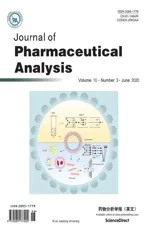Preface for special issue on new analytical techniques and methods in drug metabolism and pharmacokinetics
2020-02-14GuangoGeMingsheZhu
Guango Ge, Mingshe Zhu
a Institute of Interdisciplinary Integrative Medicine Research, Shanghai University of Traditional Chinese Medicine, Shanghai, China.
b MassDefect Technologies, Princeton, NJ, USA.
Analytical technologies and approaches for drug metabolism and pharmacokinetics (DMPK) research in the pharmaceutical industry and academic research institutes have evolved rapidly over the past decade. On one hand, the discovery and development of small molecule drug candidates requires earlier and better understanding of their absorption, distribution,metabolism and excretion (ADME) in human as well as their interactions with metabolizing enzymes, transporters and drug targets, such as receptors and DNA. On the other hand, several new drug modalities and deliver systems, such as peptide and protein therapeutics, antibody-drug conjugates (ADC) and nano drug delivery systems, have been introduced into the drug pipelines. Their bioanalysis and ADME investigationin vitroandin vivorepresent great challenges, and as such,demand suitable analytical technologies and strategies that may be totally different from those routinely used for DMPK studies of small molecules. This special issue of the Journal of Pharmaceutical Analysis focuses on analytical technologies and methods recently developed for improving the efficiency and quality of ADME studies in support of traditional drug discovery programs or for investigating the metabolism and disposition of new drug modalities and delivery systems.
In this special issue, we are pleased to feature three comprehensive review articles on state-of-the-art bioanalytical technologies. Shou gives an overview on high-throughputin vitroADME screening as an essential part of lead optimization for synthetic molecules, which has been recently“industrialized” through the development of cutting-edge analytical technology, software and automation. Zhu et al.summarize current LC-MS-based strategies for characterization and quantification of ADC and discuss the challenges and opportunities in this rapidly evolving field. Wang et al.evaluate newly developed techniques for bioanalysis of nano drug delivery systems in animals and human, which is far more complicated than the monitoring of small molecular drugs in plasma in terms of structure, composition and aggregation state, whereby almost all of the conventional LC/MS methods are inadequate.
We also feature six research articles in the areas of development and application of new analytical techniques and methods in support of DMPK research. Sauter et al.present an ultra-sensitive bioanalytical method of the therapeutic peptide exenatide for accurate pharmacokinetic assessment using UPLC-MS/MS. Yao et al. provide results of evaluating and applying a new software-aided analytical workflow for targeted and untargeted detection and structural characterization of cyclic peptide metabolitesin vitroby LC/HRMS. Ma et al. report a novel method to evaluate DNA binding efficiency of the DNA alkylator pyrrolobenzodiazepine in tumors of mouse models following IV administration of its ADC conjugate. Zhang et al. discuss a selective and sensitive bioluminescence assay for rapidly evaluating CES1 activityin vivoand its application to investigating the effects of orally administered TCMs on CES1 activity in rats. Ge et al. developed an ultra-sensitive and easy-to-use assay for sensing human UGT1A1 activities in biological systems, which provided a practical approach for exploring the biological roles of UGT1A1 in living systems and characterization the modulatory effects of small molecules on this key conjugative enzyme. Sharma et al. established a convenient testing scheme for rapidly screening all human CYPs for activity towards any given candidate substrate using a cocktail enzyme bag strategy.
Altogether, this special issue is a collection of research topics on cutting-edge technologies for studying biotransformation, pharmacokinetics and interactions with metabolizing enzymes and targeted molecules of a variety of drug modalities. We thank all of the authors for their contributions, and hope the readers find their articles as compelling as we did.
